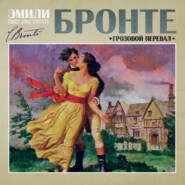По всем вопросам обращайтесь на: info@litportal.ru
(©) 2003-2025.
✖
Сборник лучших произведений английской классической литературы. Уровень 3
Настройки чтения
Размер шрифта
Высота строк
Поля
“You came to bid me good-bye, then: you are just in time probably.”
“No, no, Helen!” I tried to stop my tears.
Helen started to cough. It did not, however, wake the nurse. When the cough was over, Helen lay some minutes exhausted. Then she whispered, “Your feet are bare. Lie down and cover yourself.”
I did so. She put her arm over me and continued, “I am very happy, Jane; and when you hear that I am dead, you must not grieve: there is nothing to grieve about. We all must die one day. My illness is gentle, I am in no pain, my mind is at rest. I have only a father; and he has lately married, and will not miss me. I am happy to die young; I will avoid so many sufferings.”
I felt so comfortable by her side, and did not want to leave her. I stayed with her that night and we both soon fell asleep.
When I woke up, it was day. I was in somebody's arms; the nurse held me; she was carrying me through the passage back to the dormitory.
A day or two afterwards I learned that Miss Temple, on returning to her own room at dawn, had found me on Helen's bed; my face against Helen Burns's shoulder, my arms round her neck. I was asleep, and Helen was-dead.
She was buried in Brocklebridge churchyard with no headstone. Now a grey marble tablet marks the spot, inscribed with her name, and the word 'Resurgam' meaning “I will rise again.”
Chapter 10
When the typhus fever had fulfilled its mission at Lowood, it gradually disappeared. But news of the disease spread, its victims had drawn public attention on the school. An inquiry was held into how the disease could have broken out[18 - An inquiry was held into how the disease could have broken out – Было проведено расследование, чтобы выяснить, как могла начаться болезнь], and soon the public found out about the unhealthy nature of the site, our poor diet and clothing, about our cold overcrowded dormitories. The discovery brought changes to our institution and shame to Mr. Brocklehurst.
He had been spending only a small part of the school's funds on the students. Some said he spent the rest on himself and his family; but it could not be proved.
Because of his wealth and family connections, Mr. Brocklehurst retained the post of treasurer, but now he had to answer to a committee of new governors. The committee decided to move the school to a new building on the hillside, where there was no fog. We were given bigger helpings, good clothes and proper boots, and more space and time to ourselves. And so Lowood was transformed from a miserable, cruel institution, into a flourishing school with happy, healthy pupils.
I stayed there for eight years. My life was uniform: but not unhappy. My teachers supported me. In time I rose to be the first girl of the first class. Since sixteen I became an assistant teacher to the younger girls.
Through all changes Miss Temple stayed at Lowood. For me, she was a mother, governess, and, latterly, companion. When I grew up, she became a dear friend. Looking at her, I turned calm and quiet and started to appear disciplined even to myself.
But at this period she married, removed with her husband (a clergyman, an excellent man) to a distant county, and was lost to me. Destiny, in the shape of the Rev. Mr. Nasmyth, came between me and Miss Temple. I watched her leave in a carriage and with her was gone every feeling, every association that had made Lowood in some degree a home to me.
With her all calmness I had acquired previously was gone, too. Now I was left in my natural element, and beginning to feel old emotions.
My world had for some years been in Lowood: my experience had been of its rules and systems; now I remembered that the real world was wide, and that a field of hopes and fears, of sensations and excitements, awaited those who had courage to go forth.
I went to the window, opened it, and looked out. My eye passed all other objects to rest on those most remote. I traced the white road going round the base of one mountain, and vanishing in a gorge between two. How I longed to follow it farther! I recalled the time when I had travelled that very road when I was brought to Lowood. I had never quitted it since. My vacations had all been spent at school. Moreover, I had had no communication by letter or message with the outer world. I knew nothing but school-rules, school-duties, school-habits and the voices, faces, phrases, costumes, and preferences of the Lowood people.
And now I felt that it was not enough. I got tired of the routine of eight years in one afternoon. I desired liberty.
Here a bell for supper called me downstairs, and I descended planning to return to my thoughts at bedtime.
Unfortunately, I shared my room with another young teacher, Miss Gryce. She could talk endlessly about trivial matters I hardly cared about, and I often forced myself to look interested. Tonight she insisted on chattering and gossiping as usual. And I felt a great amount of relief when she snored at last.
I sat up in bed. It was a chilly night; I covered my shoulders with a shawl, and then I proceeded TO THINK again with all my might.
“What do I want? A new place, in a new house, amongst new faces, under new circumstances. How do people do to get a new place? I have no friends. But many people have no friends. What is their resource?”
I could not tell. I got up and took a turn in the room, then again crept to bed. As I lay down the suggestion came to me all of a sudden. “Advertisement! You must advertise in the paper! You will need money, you will go to the post in Lowton and ask to be addressed as J.E. The letters could come to the post-office there. A week after you could go and collect the replies.”
As the plan was ready, I felt satisfied and fell asleep.
In the morning I wrote my advertisement. Here is what I put in it:
“A young lady with experience of teaching desires to work in a private family where the children are under fourteen (I thought that as I was barely eighteen, it would not do to undertake the guidance of pupils nearer my own age). She is qualified to teach the usual branches of a good English education, together with French, Drawing, and Music.”
I kept the document locked in my drawer.
I asked the new superintendent[19 - superintendent – директор] to go to Lowton, in order to perform some small commissions for myself and one or two of my fellow-teachers. Permission was given, and I went. It was a walk of two miles, the evening was wet, but the days were still long. I brought the letter to the post-office, and came back through heavy rain with a relieved heart.
The next week seemed unbearably long. I counted days and was excited when it was time to go. So, I took another evening walk to the Lowton thinking whether any letters were awaiting me in the post-office.
The old postmistress looked at me suspiciously when I asked if there were any letters for J.E. She looked through a drawer full of envelopes for so long that my hopes began to fade.
Finally, she handed me an envelope.
“Is there only one?” I asked.
“There are no more,” she said, and putting it into my pocket I hurried back to Lowood. I had to be back by eight, and it was half-past seven already. I decided to open the letter in my own room.
When I got back, there were things to do. I had to sit with the girls during their hour of study; then it was my turn to read prayers; to see them to bed. At last, I had supper with the other teachers. Then I had to wait again until my inevitable companion Miss Gryce fell asleep, hoping she would do it before our candle burned down to nothing. There still remained an inch of candle when I heard her snoring. I now took out my letter; the seal was an initial F.; I broke it; the contents were brief.
“If J.E. possesses the acquirements mentioned, and if she possesses a satisfactory character, a situation can be offered her, where there is one pupil, a little girl, under ten years, and where the salary is thirty pounds per year. J.E. is requested to send references, name, address, and all particulars to the direction: Mrs. Fairfax, Thornfield, near Millcote, – shire.”
I read it again and again. The handwriting was old-fashioned and uncertain, like that of elderly women. Mrs. Fairfax! I saw her in a black gown and widow's cap, a model of elderly English respectability. Thornfield! that, doubtless, was the name of her house: a neat orderly spot.-shire was seventy miles nearer London than the remote county where I now resided. I longed to go where there was life and movement. It would be a complete change at least.
Here the candle went out.
My plans could no longer wait. I told superintendent that I had a chance to get a new situation where the salary would be double what I now received (for at Lowood I only got 15 pounds per year), and I needed references from Mr. Brocklehurst, or some of the committee. She was glad to help me. The next day she spoke with Mr. Brocklehurst, who said that Mrs. Reed must be written to, as she was my guardian. Mrs. Reed's reply was brief, I could do as I pleased as she had no desire to interfere in any of my affairs. Right after that, formal leave was given me to better my condition if I could. I also got an assurance, that as I had always conducted myself well, both as teacher and pupil, at Lowood, which was signed by the inspectors of the institution.
I sent all the references to Mrs. Fairfax, and got that lady's reply, stating that she was satisfied, and fixing that day fortnight as the period for my assuming the post of governess in her house. I busied myself with preparation immediately.
On my way to Thornfield I was thinking that a phase of my life was closing tonight, a new one opening tomorrow.
Chapter 11
It had been a long day. The road took sixteen hours, then I waited for two more hours in the George Inn at Millcote, feeling anxious and distressed as there was no one to meet me. I asked the waiter about Thornfield but he did not know the place. But some time later he returned and called me by my name. “Person here waiting for you,” he added.
I jumped up, a man was standing by the open door, and in the lamp-lit street I dimly saw a one-horse carriage. He hardly spoke, he put my luggage on the roof and helped me in. As I asked him how far Thornfield was, he answered that the road usually took about an hour and a half.
I was again alone with my thoughts. I concluded that Mrs. Fairfax was not very rich and felt better as I had never lived amongst fine people but once, and I had been very miserable with them. I wondered if she lived alone except this little girl. If so, I was sure I would get along with her. At least, I resolved to do my best. At Lowood, I had taken the same resolution and I had kept it.
The roads were heavy, the night misty. About two hours later the driver got down and opened a pair of gates. We continued up a long drive and stopped in front of the house. Candlelight glowed from one window at the front; the rest were dark. I climbed out of the buggy with my suitcase, and went to the front door, where a maid was waiting.
“Will you walk this way, ma'am?” she said, and I followed her across the large, square hallway with high doors all round.
She opened a door and showed me through. I couldn't have hoped for a happier scene. The room was small, lit by candles and warmed by a crackling fire. In an armchair sat a plump old lady in a black dress, a cap and a shawl. She was knitting, and at her feet, close to the hearth, curled a contented-looking cat. It was Mrs. Fairfax, just as I had imagined her-except that she looked much friendlier than I had hoped.
“How do you do, my dear?” she said. “I'm afraid you've had a long journey-John drives so slowly-and you must be freezing. Come to the fireside.”
“Mrs. Fairfax?”

















